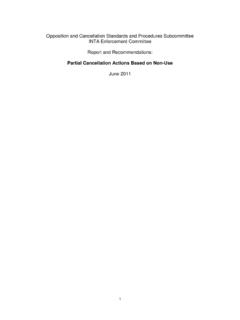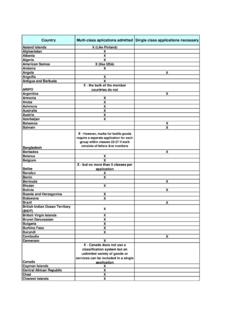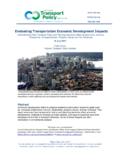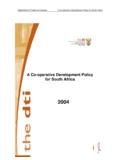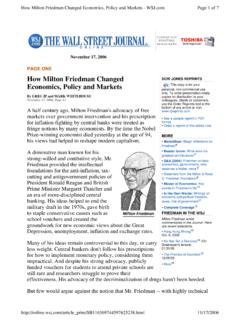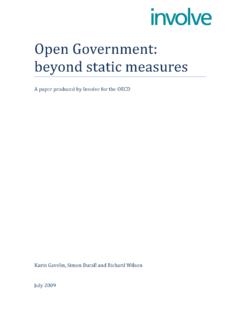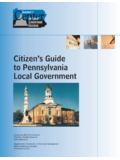Transcription of U.S. Economic Sanctions and Anti-Boycott Laws
1 Economic Sanctions and Anti-Boycott laws May 2012 Update Paul F. Kilmer, Holland & Knight LLP, Michael J. Mlotkowski Roberts, Mlotkowski, Safran & Cole, PC 1 TABLE OF CONTENTS I. EXECUTIVE 2 A. CURRENT Sanctions AFFECTION TRADEMARK 2 B. CURRENT PARTICIPANTS IN UNLAWFUL 2 II. 2 III. ISSUE 3 IV. Sanctions 4 A. 4 B. 5 C. BURMA (MYANMAR).. 6 D. THE 6 E. IVORY COAST (COTE D'IVOIRE).. 7 F. 7 G. 8 H. 9 I. 9 J. 10 K. NORTH 11 L. 12 M. 12 N. 13 O. 13 P. Sanctions AGAINST DRUG TRAFFICKERS & MIDDLE EAST 14 V. Anti-Boycott 14 VI.
2 INTA 15 VII. ADDITIONAL 16 2 I. EXECUTIVE SUMMARY A. Current Sanctions Affecting Trademark Owners Currently there are either "General Licenses" for intellectual property protection in all nations in relation to which the United States has imposed Economic Sanctions or such Sanctions programs otherwise permit protection of intellectual property rights. Therefore, any person or entity wishing to protect intellectual property assets in nations such as Cuba, Iran, North Korea or Syria may do so without obtaining a "Specific License" from the Office of Foreign Assets Control, Department of the Treasury.
3 Thus, at the current time, all Sanctions programs allow persons and entities to apply for trademark registration, maintain existing registrations and seek other forms of trademark protection ( trademark opposition or cancellation actions and trademark infringement litigation) without first contracting or requesting permission from the government . Similarly, payments may be made to foreign firms which assist with these measures and those payments may include official fees to the agencies of a government against which Economic Sanctions apply.
4 However, since Sanctions programs may change quickly, persons wishing to protect their trademarks should review the Treasury Department's Office of Foreign Assets Control website (at ) before retaining firms in sanctioned nations or paying official fees (directly or indirectly) to government agencies in those nations. B. Current Participants in Unlawful Boycotts Compliance with or participation in the secondary boycott of Israel by persons is strictly prohibited. Currently, INTA is unaware of any nations which are enforcing or participating in the secondary boycott of Israel in relation to trademark matters (that is, INTA is unaware of any nations which are requesting completion of unlawful boycott questionnaires or requiring similar types of disclosures, or actions in compliance with, which would result in violation of Anti-Boycott laws or regulations).
5 However, at any time nations may change their boycott regimes and therefore persons wishing to protect their trademarks outside the United States should review the website of the Department of Commerce's Office of Anti-Boycott Compliance ( ). II. BACKGROUND The United States maintains a series of laws and regulations that impose Economic Sanctions against targeted foreign countries, individuals and organizations to advance foreign policy 3 and national security objectives. The Economic Sanctions programs of the government are powerful foreign policy tools.
6 The use of Economic Sanctions goes back to the earliest days of the United States and includes such tools as trade embargoes, blocked assets controls, travel restrictions and other commercial and financial restrictions. The management of Economic Sanctions programs is often entrusted to the Secretary of the Treasury, who has delegated his authority to the Office of Foreign Assets Control ("OFAC"). Since the September 11, 2001 attacks, however, a number of Executive Branch agencies are more involved in Economic Sanctions and trade control issues that are seen to relate to terrorism or it's financing.
7 For example, the Department of State, the Department of Commerce and the Department of Transportation now have more active rolls in Sanctions programs. Historically, United States government embargoes or Economic Sanctions programs have prohibited various forms of trade and investment by nationals. They often block or freeze targeted countries or individuals assets in the United States. The prohibitions have sometimes included a ban on the payment of fees and expenses for protecting and maintaining intellectual property rights.
8 In part, through efforts by and on behalf of INTA, such payments are now permitted, either by General License or because the particular Sanctions program does not prevent trademark registration and maintenance. The government also prohibits cooperation with unapproved boycotts and embargoes by other countries. Since 1948, the Arab League countries have maintained an official boycott of trade with Israel and against companies that trade with Israel. Since the 1979 Egypt-Israel Peace Treaty, Egypt has not officially participated in the boycott .
9 In recent years, other Arab countries such as Jordan, Iraq and Syria and some members of the Gulf Cooperation Council ("GCC") have ended their participation in the boycott . In 1977, the United States enacted Anti-Boycott legislation specifically designed to counteract the Arab League's boycott of Israel. The pertinent provisions of the Anti-Boycott legislation are contained in the Export Administration Act and its implementing regulations administered by the Department of Commerce. The Internal Revenue Service administers similar, but separate, regulations designed to counter the Arab League boycott .
10 The Economic Sanctions regulations and both sets of Anti-Boycott regulations carry substantial penalties, both criminal and civil, assessable against companies and individual employees or officers who violate the regulations. III. ISSUE DEFINITION Trademark owners may be directly affected by Sanctions regulations and Anti-Boycott requirements. The establishment and maintenance of trademark rights requires a mark to be registered and renewed with foreign governments that may choose to participate in the Arab boycott of Israel or are targets of Sanctions .



